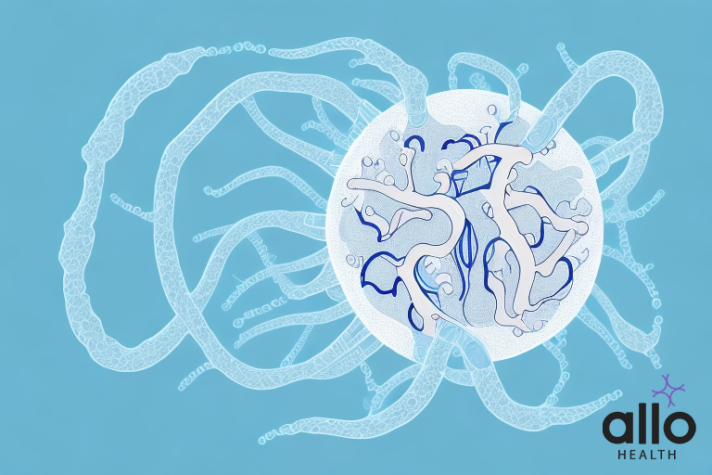Does HRT Make You Infertile?

Allo Health is dedicated to personalized well-being, offering support and trusted information tailored to individual health goals. The platform emphasizes human-generated content, led by a distinguished medical team of experts, including physicians and sexual health specialists. Their commitment to credibility involves rigorous fact-checking, authoritative research, and continuous updates to ensure accurate, up-to-date information. Allo Health's unique approach goes beyond conventional platforms, providing expert-led insights and a continuous commitment to excellence, with user feedback playing a crucial role in shaping the platform's authoritative voice.

Dr Sanina Mansoor holds MBBS degree from Yenepoya university,Mangalore.She has 8 years of experience working as a medical officer at various health centres and medical colleges.
Why This Was Upated?
Our experts continually monitor the health and wellness space, and we update our articles when new information became available.
Updated on 21 February, 2024
- Article was updated as part of our commitment to diversity, equity, and inclusion.

"The following blog article may discuss medical treatments and interventions. However, it is important to note that the information provided is for general educational purposes only and should not be considered as a substitute for professional medical advice, diagnosis, or treatment. Always seek the guidance of a qualified healthcare professional for personalized medical advice.
Book consultation
Medical treatments are complex and should be tailored to individual circumstances. The information presented in this blog may not be applicable to everyone, as each person's medical condition, history, and needs are unique. Only a qualified healthcare professional can evaluate your specific medical situation, consider relevant factors, and provide appropriate recommendations for diagnosis, treatment options, and monitoring.
It is crucial to note that self-diagnosis, self-medication, or relying solely on the information provided in this blog for treatment decisions can have serious health consequences. "
Are you considering hormone replacement therapy (HRT) but worried about its impact on your fertility? You’re not alone. Many women wonder if undergoing HRT for menopause symptoms could cause irreversible infertility. In this article, we’ll explore the relationship between HRT and fertility, and help you make an informed decision about managing your menopause symptoms. Read on to learn more.
What Is HRT?
HRT stands for Hormone Replacement Therapy, which is a medical treatment that involves replacing hormones that the body is no longer producing in sufficient quantities. This therapy is commonly used to alleviate symptoms associated with hormonal imbalances or deficiencies, especially in the context of menopause or gender transition.
- Menopausal Hormone Replacement Therapy (HRT):
- Purpose: Menopause is a natural biological process that occurs in women, typically in their late 40s or early 50s, when the ovaries cease to produce estrogen and progesterone. The decline in these hormones can lead to various symptoms such as hot flashes, night sweats, mood swings, and vaginal dryness.
- Hormones used: Estrogen and sometimes progesterone are the hormones replaced in menopausal HRT. The therapy can be administered in various forms, including pills, patches, creams, or gels.
- Transgender Hormone Replacement Therapy:
- Purpose: HRT is also used as part of gender-affirming treatment for transgender individuals who wish to undergo a gender transition. The goal is to develop physical characteristics that align with their gender identity.
- Hormones used: For transgender women (assigned male at birth), estrogen is typically administered, often in combination with an anti-androgen to suppress testosterone. For transgender men (assigned female at birth), testosterone is administered.
- Hormone Replacement Therapy in Other Conditions:
- Hypogonadism: HRT can be used to replace hormones in individuals with hypogonadism, a condition where the gonads (ovaries or testes) do not produce enough hormones.
- Thyroid Hormones: Replacement of thyroid hormones is another form of HRT used in individuals with hypothyroidism, a condition where the thyroid gland doesn’t produce enough thyroid hormones.
- Risks and Benefits:
- Benefits: HRT can alleviate symptoms associated with hormonal imbalances and improve the quality of life for individuals experiencing menopausal symptoms or undergoing gender transition.
- Risks: Depending on the type and duration of HRT, there may be risks associated with hormone replacement, such as an increased risk of certain cancers, blood clots, or cardiovascular concerns. The risks and benefits should be carefully considered and discussed with a healthcare provider.
It’s important to note that HRT should be administered under the supervision of a healthcare professional who can assess individual health conditions, monitor hormone levels, and adjust the treatment accordingly. The decision to undergo HRT should be made in consultation with a qualified medical professional after a thorough evaluation of potential risks and benefits.

HRT Uses & Benefits
Hormone Replacement Therapy (HRT) is used for various medical purposes, and its benefits depend on the specific condition being treated. Here are some detailed uses and benefits of HRT:
- Menopausal Hormone Replacement Therapy (HRT):
- Uses:
- Alleviation of Menopausal Symptoms: HRT is primarily used to manage symptoms associated with menopause, such as hot flashes, night sweats, mood swings, and vaginal dryness. By replacing estrogen and, if necessary, progesterone, HRT helps balance hormonal levels.
- Prevention of Osteoporosis: Estrogen plays a crucial role in maintaining bone density. HRT may be prescribed to postmenopausal women to help prevent osteoporosis and reduce the risk of fractures.
- Benefits:
- Symptom Relief: One of the main benefits of menopausal HRT is the relief of bothersome symptoms, improving the quality of life for women experiencing menopause.
- Bone Health: HRT can contribute to maintaining bone density, reducing the risk of fractures associated with osteoporosis.
- Uses:
- Transgender Hormone Replacement Therapy:
- Uses:
- Gender Affirmation: HRT is a fundamental component of gender-affirming treatment for transgender individuals. It helps align physical characteristics with gender identity.
- Benefits:
- Development of Secondary Sexual Characteristics: For transgender women, estrogen promotes the development of feminine secondary sexual characteristics, such as breast development and a more feminine body shape. For transgender men, testosterone induces the development of masculine features like facial hair and a deeper voice.
- Psychosocial Well-being: HRT can positively impact mental health and well-being by aligning physical appearance with gender identity, reducing gender dysphoria.
- Uses:
- Hypogonadism and Other Hormonal Deficiencies:
- Uses:
- Treatment of Hypogonadism: HRT can be used to replace deficient hormones in individuals with hypogonadism, a condition where the gonads (ovaries or testes) do not produce enough hormones.
- Thyroid Hormone Replacement: In cases of hypothyroidism, where the thyroid gland is underactive, replacement therapy with thyroid hormones is essential.
- Benefits:
- Restoration of Hormonal Balance: HRT helps restore hormonal balance in individuals with hormonal deficiencies, addressing symptoms and improving overall health.
- Uses:
- Other Conditions:
- Cardiovascular Health: Some studies suggest that HRT, especially in early postmenopausal years, may have cardiovascular benefits, including a potential decrease in the risk of heart disease. But the use of HRT for cardiovascular protection is a complex and debated topic, and individual risk factors should be considered.
It’s crucial to note that while HRT offers benefits, it is not without potential risks. The decision to undergo HRT should be made in consultation with a healthcare provider who can assess individual health, discuss potential risks, and tailor the treatment plan to the specific needs and circumstances of the patient. Regular monitoring and adjustments to the hormone regimen may be necessary to optimize benefits and minimize risks.
HRT Side Effects & Precautions
Hormone Replacement Therapy (HRT) can have both benefits and potential side effects. The decision to undergo HRT should be made in consultation with a healthcare provider who can assess individual health, discuss potential risks, and tailor the treatment plan to the specific needs and circumstances of the patient. Here are details about side effects and precautions associated with HRT:
Common Side Effects of HRT:
- Menopausal Hormone Replacement Therapy (HRT):
- Breast Tenderness: Estrogen can cause breast tenderness or enlargement.
- Nausea: Some individuals may experience nausea, especially when starting HRT.
- Headaches: Headaches are a common side effect, particularly during the initial stages of treatment.
- Spotting or Irregular Bleeding: For women taking estrogen without progesterone, there may be irregular bleeding or spotting.
- Transgender Hormone Replacement Therapy:
- Changes in Libido: HRT can affect sexual desire.
- Acne: Some individuals may experience acne, particularly during the initial stages.
- Mood Changes: Hormonal fluctuations can impact mood and emotions.
Potential Risks and Precautions:
- Cardiovascular Risks:
- Blood Clot Formation: Estrogen, especially when combined with certain risk factors, may increase the risk of blood clot formation, which can lead to deep vein thrombosis or pulmonary embolism.
- Cardiovascular Disease: Long-term use of HRT may have implications for cardiovascular health, and the decision to use HRT should consider individual cardiovascular risk factors.
- Cancer Risks:
- Breast Cancer: There is evidence suggesting that long-term use of combined estrogen and progestin HRT may slightly increase the risk of breast cancer.
- Endometrial Cancer: Estrogen-only HRT in women with an intact uterus may increase the risk of endometrial cancer. Adding progestin reduces this risk.
- Other Health Concerns:
- Bone Health: While HRT can help maintain bone density, there is evidence that long-term use may have implications for bone health, and regular monitoring is important.
- Gallbladder Disease: Estrogen use may increase the risk of gallbladder disease.
- Precautions:
- Individualized Approach: HRT should be approached on an individualized basis, taking into account the patient’s medical history, overall health, and risk factors.
- Regular Monitoring: Regular monitoring of hormone levels and overall health is crucial to ensure the optimal balance of hormones and to detect any potential concerns early.
- Shortest Duration: The general recommendation is to use the lowest effective dose for the shortest duration necessary to achieve treatment goals, especially in postmenopausal women.

It’s important to note that the risks and benefits of HRT can vary depending on factors such as age, overall health, and the specific hormones used. Women and transgender individuals considering HRT should have open and detailed discussions with their healthcare provider to make informed decisions about their treatment. Regular follow-ups and communication with healthcare providers are essential for adjusting the treatment plan as needed.
Does HRT Make You Infertile?
Hormone Replacement Therapy (HRT) can impact fertility, but the effect depends on the specific context, the type of HRT, and individual factors. Here are details on how HRT may affect fertility in different situations:
- Menopausal Hormone Replacement Therapy (HRT):
- Impact on Fertility: Menopausal HRT, which typically involves estrogen and, in some cases, progestin, is not intended for use as a contraceptive. But, it does not guarantee infertility, and conception may still be possible in some cases.
- Fertility After Stopping HRT: Fertility may return after discontinuing menopausal HRT, especially if a woman is still within the age range where natural fertility is possible. It’s essential to use contraception if pregnancy is not desired.
- Transgender Hormone Replacement Therapy:
- Transgender Women (MTF): Estrogen therapy for transgender women can lead to a reduction in sperm production and fertility. But it does not guarantee complete infertility, and individuals may still be capable of fathering a child, especially early in the course of hormone treatment.
- Transgender Men (FTM): Testosterone therapy for transgender men typically results in a temporary cessation of menstruation and ovulation. Fertility is usually restored after stopping testosterone therapy, allowing the possibility of pregnancy.
- Hypogonadism and Other Hormonal Deficiencies:
- Impact on Fertility: In cases of hypogonadism or other hormonal deficiencies, HRT is often used to replace deficient hormones and address symptoms. Depending on the specific condition and treatment plan, fertility may be preserved or impacted differently.
Considerations:
- Individual Variability: The impact of HRT on fertility can vary widely among individuals. Some may experience a quick return to fertility after discontinuing hormone therapy, while others may have a more prolonged effect.
- Age: Age is a crucial factor. Younger individuals may have a higher likelihood of restoring fertility after discontinuing HRT compared to those who are older.
- Duration of HRT: The length of time on HRT may influence the degree of impact on fertility. Prolonged use may have a more significant effect on reproductive function.
Counseling and Family Planning:
- Individuals considering HRT should receive thorough counseling from healthcare providers regarding the potential impact on fertility.
- For those who wish to preserve fertility, options such as sperm or egg freezing before starting HRT may be discussed.
- Family planning discussions should be part of the overall treatment plan, taking into account the individual’s reproductive goals.
It’s important to emphasize that fertility is a complex and individualized aspect of health. Anyone considering HRT and concerned about its impact on fertility should discuss their specific situation with a knowledgeable healthcare provider who can provide personalized information and guidance based on the individual’s health and reproductive goals.
Most Asked Questions
-
Does HRT make you infertile?
HRT especially for transgender individuals, can impact fertility. For transgender women (MTF), estrogen therapy typically reduces sperm production, but it doesn't guarantee complete infertility. Transgender men (FTM) on testosterone may experience temporary cessation of menstruation and ovulation, with fertility usually restored upon stopping testosterone therapy. But, individual responses vary.
-
How does menopausal HRT affect fertility?
Menopausal hrt, involving estrogen and sometimes progestin, is not intended as contraception. While it doesn't ensure infertility, fertility may decrease during treatment. After stopping hrt, especially for younger individuals, there's a possibility of returning fertility, but contraception is advisable if pregnancy is not desired.
-
Can you conceive while on HRT for menopause?
Conceiving while on menopausal HRT is possible but not the intended outcome. It's crucial to use contraception if avoiding pregnancy. After stopping HRT, fertility may return, but the chances can vary among individuals, depending on factors like age and the duration of HRT use.
-
How long does it take for fertility to return after stopping HRT?
The timeframe for fertility to return after stopping HRT is variable. Younger individuals may experience a quicker return, while older individuals might take longer. Individual factors, such as the type and duration of HRT, influence how hormones impact reproductive function.
-
Should I consider fertility preservation before starting HRT?
For those concerned about fertility, considering preservation options like sperm or egg freezing before starting HRT is advisable. This allows individuals to have reproductive options in the future. Discussing family planning goals with a healthcare provider is essential to make informed decisions about the impact of HRT on fertility.






































